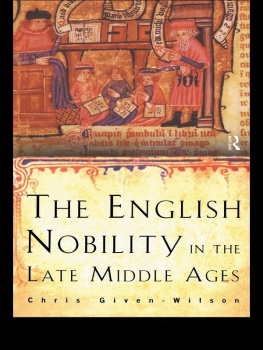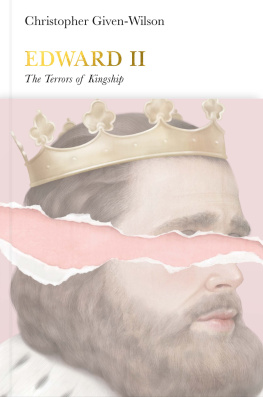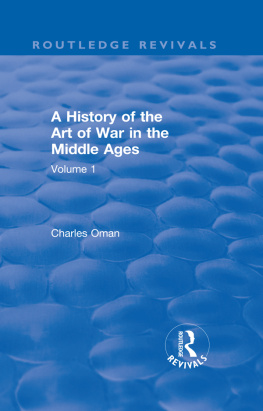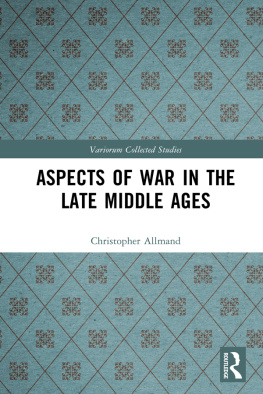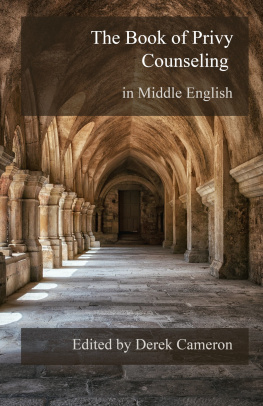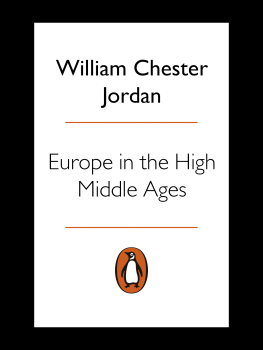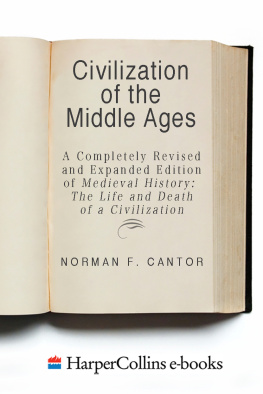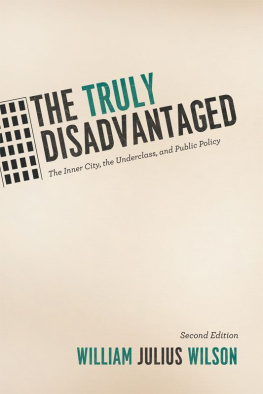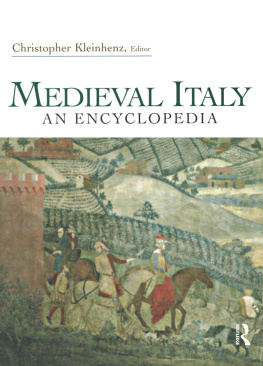For ALICE, with love and gratitude
First published in 1987 by
Routledge & Kegan Paul Ltd
This edition published in the Taylor & Francis e-Library, 2003.
First published in paperback in 1996 by
Routledge
11 New Fetter Lane, London EC4P 4EE
Simultaneously published in the USA and Canadaby Routledge
29 West 35th Street, New York, NY 10001
Chris Given-Wilson 1987, 1996
All rights reserved. No part of this book may be printed or reproducedor utilised in any form or by any electronic, mechanical, or othermeans, now known, or hereafter invented including photocopying andrecording, or in any information storage or retrieval system, withoutpermission in writing from the publishers.
British Library Cataloguing in Publication DataA catalogue record for this book has been requested.
Library of Congress Cataloguing in Publication DataGiven-Wilson, Chris.
The English nobility in the late Middle Ages.
Bibliography: p.
Includes index.
1. EnglandNobilityHistory. 2. England
GentryHistory. 3. Social historyMedieval,
5001500. 4. EnglandHistoryMedieval period,
10661485. I. Title.
HT653.G7G58 1987 305.52230942 8633862
ISBN 0-203-44126-5 Master e-book ISBN
ISBN 0-203-74950-2 (Adobe eReader Format)
ISBN 0-415-14883-9 (Print Edition)
Preface
The reason for dissension among the northern lords was this: all were gentlemen and nobles [generosi et nobiles], though one might be called an earl [comes], another a baron [baro], and others lords [domini], but when it came to taking money, they claimed to be equal; this being refused to them, they departed to their homes.
I use the word nobility in quite a broad sense in this book, to describe not just those individuals or families, numbering a hundred or less in late medieval England, who were distinguished by their receipt of individual summonses to parliament (that is, the peerage), but also those whom modern and late medieval historians more commonly refer to as the gentry. What made a man or a family noble in fourteenth-century England is difficult to define precisely. Good birth, inherited land and lordship, and membership of the officer ranks in battle were probably the most important determinants of status. Title, legal privilege, a substantial degree of wealth, and the trappings of the noble lifestyle provided the visible evidence of that status. Ultimately, though, what mattered most was the extent to which a mans standing in society was accepted by those whom he regarded as his social equals.
The essence of social class is the way a man is treated by his fellows (and, reciprocally, the way he treats them), not the qualities or the possessions which cause that treatment. It would be possible, and perhaps useful, to group people simply in terms of their attributes, without asking how those attributes affected their social relations, but
This is what makes social categorisation so tricky, especially at six hundred years remove. Seen from this point of view, we are entitled to wonder whether it is at all possible to get to the essence of social class in the Middle Ages, or whether we must simply be content with describing social types. Nevertheless, there are indicators, and the attempt has to be made: not only because it is an interesting subject per se, but also because in the Middle Ages social status was closely related to political authority, and it is impossible to understand the English polity without reference to the classes in which society was ordered. That is why much of the first part of this book is devoted to the problem of social stratification.
On the whole, this book is an attempt to synthesise recent research rather than to present a substantial body of new evidence. In the thirty years and more since K.B.McFarlane inspired a new generation of scholars to take a fresh look at the medieval English nobility, there has been a great deal of research on the subject some on individuals, some on families, some on regional societies, and some on more general problems. In certain important respects, the thrust of this recent research has changed direction. Whereas McFarlane was for the most part concerned with the peerage, and with national politics, the emphasis during the last fifteen or so years has shifted more towards the study of the lesser ranks of the nobility (that is, the gentry, broadly speaking), and of local rather than national politicsor at least the interplay of local and national. This is a shift which I have tried to reflect. I have drawn heavily on this growing body of research (much of it unpublished), and, as is evident from the Bibliography, my first and greatest debt is to those historians upon whose work I have relied.
My second major debt is to my students. This book grew out of a special subject on the English nobility in the reign of Edward III which I taught for several years at the University of St Andrews. It is often said that students little realise how much their lecturers learn from teaching them, but that makes it no less true, and I am grateful to them for their patience, their hard work, and the frequent inspiration which they provided. I am also grateful to Andrew Wheatcroft, who first suggested that I might write this book; to Elaine Donaldson of Routledge & Kegan Paul, for her meticulous and well-informed work on the typescript; to Nick Hooper now of Westminster School, who read parts of the typescript and corrected several errors; and to Bridget Harvey, from whom I have learned much about the Berkeleys in the fourteenth century. My special thanks, as ever, go to Alice, who makes most things possible.
Chris Given-Wilson
St Andrews
Preface to the paperbackedition
During the eight years since this book was first published, the study of the late medieval English nobility has both continued in the directions outlined above, i.e. with the emphasis by and large upon local society and upon the gentry (now, according to Mark Ormrod, regarded in much modern historical writing as the real heart of late medieval political society), as indeed I should have on the relationship between the gentry and the urban bourgeoisie.
Of the books to appear since 1987 which are specifically devoted to the fourteenth-century nobility, perhaps the most influential has been Simon Walkers study of the retinue of John of Gaunt, which, although it was actually published in 1986, appeared after my own book had gone to press.
All of these works, and many others, have in their own way advanced the study of the late medieval nobility; each of them, therefore, has meant that had this book been written in 1996 rather than 1986, it would have been in certain respects a different book. Nevertheless, my intention, were I writing it now, would remain unchanged, namely, to provide a brief and relatively broad-ranging synthesis of late twentieth-century scholarship on the late medieval English nobility.

